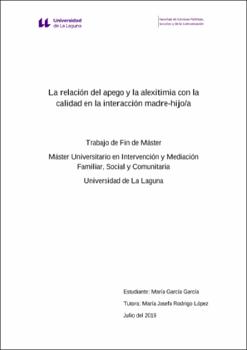La relación del apego y la alexitimia con la calidad en la interacción madre-hijo/a
Author
García García, MaríaDate
2019Abstract
La responsabilidad parental, según el Consejo de Europa en la Rec(2006), es la
de promover relaciones positivas con los hijos e hijas para garantizar sus derechos y
optimizar su desarrollo y su bienestar. Sin embargo, existen condicionantes por parte de
la madre que pueden estar influyendo en la calidad de la relación madre-hijo/a, tales
como la percepción de su apego adulto y la alexitimia. Por ello se llevó a cabo una
investigación centrada en analizar la relación del apego y la alexitimia con la calidad en
la interacción madre-hijo/a evaluada mediante la Escala de Accesibilidad Emocional. Se
emplearon la escala observacional y dos cuestionarios para analizar dicha relación en
una muestra de 75 madres y sus hijos/as de diversos municipios de las islas de Tenerife
y Gran Canaria. Los resultados obtenidos muestran que la mayor calidad de la
relaciones madre-hijo/a se da en aquellas madres de la zona rural y con estudios
superiores y la menor calidad se da en aquellas madres con mayor número de hijos/as y
a su vez éstos/as mayores en la edad. Asimismo los resultados reflejan que las
puntuaciones altas de alexitimia de la madre se relacionan positivamente con las
dimensiones del apego inseguro adulto y que, de manera general, ambos resultan
determinantes de la calidad de la relación madre-hijo/a, ya que aquellas madres con alta
alexitimia y apego inseguro obtienen menores puntuaciones en la Escala de
Accesibilidad Emocional. Parental responsibility, according to the Council of Europe Rec (2006), is to
promote positive relationships with children to guarantee their rights and optimize their
development and well-being. However, there are conditioning factors on the part of the
mother that may be influencing the quality of the mother-child relationship such as the
perception of her adult attachment and alexithymia. Therefore, this investigation
focused on analyzing the relationship of attachment and alexithymia with the quality of
mother-child interaction using Emotional Availability (EA) Scales. This observational
scale and two questionnaires were used to analyze a sample of 75 mothers from
different municipalities of the islands of Tenerife and Gran Canaria. The results show
that the highest quality of the mother-child relationship occurs in those mothers in the
rural area and with higher education and the lowest quality occurs with those mothers
with the largest number of children and in turn these are older in age. Likewise, the
results show that high scores of alexithymia are positively related to the dimensions of
insecure attachment and that, generally, both are determinants of the quality of the
mother-child relationship since higher alexithymia and insecure attachment obtained
lower scores in the Emotional Availability (EA) Scales.





